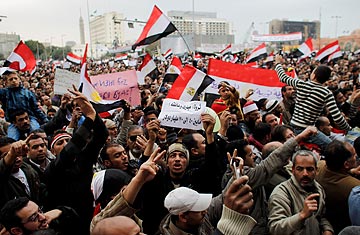
Egyptian antigovernment protesters in Cairo's Tahrir Square, the center of demonstrations, on Feb. 6, 2011
(2 of 2)
The overwhelming number of protesters in the square seem to reject that argument, however. In dozens of interviews this weekend, everyone said they would refuse to leave. Yet Egyptians are divided, even within families.
Mohamed El-Zawy, 22, an engineering student, left the square last Friday after Mubarak promised to leave in September, believing that the protesters had gained enough. But his father, Mahmoud, 60, disagreed and stayed in the square. The elder El-Zawy says he does not trust Mubarak's word, and says he speaks from experience. He was a military officer who served in the Presidential Guard for decades, including for four years under Mubarak. "He's twice before said, 'This is the last time I'm going to be a President,'" says El-Zawy. "We have had enough. More than enough."
Yet for all the fighting talk, there are signs that the country might be getting back to business — suggesting that maybe the government has concluded that it can seal off the square's tumultuous revolution behind tanks and razor wire, and resume relatively normal life beyond it. If so, it could make it more difficult, perhaps, for the protesters to continue pressuring Mubarak into an immediate exit.
On Sunday morning, the start of the workweek, traffic was snarled on Cairo's bridges crossing the river, including the key 6th October Bridge, overlooking the square, which only three days earlier saw monster gun battles between the protesters and Mubarak loyalists. Nights are quiet, aside from the chants of protesters deep inside the square — and now Cairo's familiar car horns. Two military checkpoints around one hotel vanished on Monday. Although Cairo's stock exchange remains shut, banks reopened on Sunday. And along the Corniche, or Nile riverfront, a block from Tahrir Square, families strolled under the palm trees late on Sunday afternoon.
It is almost as if there are two Egypts — the one full of revolutionary fervor inside Tahrir Square, and the one around it, in which the people are deeply sympathetic and grateful to the protesters, but would like to get back to normal. While thousands of people once again assembled in Tahrir Square on Sunday, elsewhere the toll of almost two weeks of political upheaval was evident. Long lines of people, some more than 50 deep, queued up outside banks that opened their doors for several hours on Sunday after more than a week's hiatus. Many small neighborhood stores are running low on supplies, their shelves almost bare. But gone are the makeshift checkpoints manned by pro-Mubarak heavies on neighborhood streets. Absent, too, are the protests in favor of the embattled leader. In fact, until their sudden and brief appearance on the overpass on Sunday night, it was quite difficult to find groups of pro-Mubarak supporters on the streets of the capital this weekend.
Inside the square, garbage stands in large open-air piles on the edge of what increasingly looks like a squatter camp. People appear to have dug in, with little sign of moving, and food stalls selling bread rolls and sodas have sprung up across the area. Yet even among those protesting, there are a few who are prepared to consider a compromise. Hala Shenouda, 47, a development specialist who attended a Coptic Christian mass in the square on Sunday morning, says she thought some might leave the square if Mubarak publicly cedes all his authority to Vice President Suleiman. "There have been concessions made and I feel that we are on the right track," she says. "People should not be afraid."
— With reporting by Rania Abouzeid / Cairo
